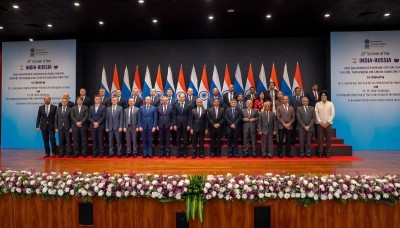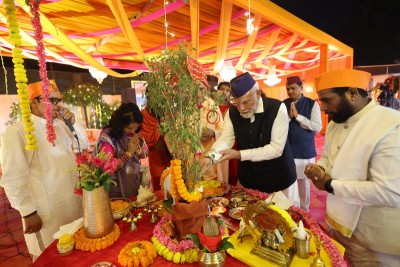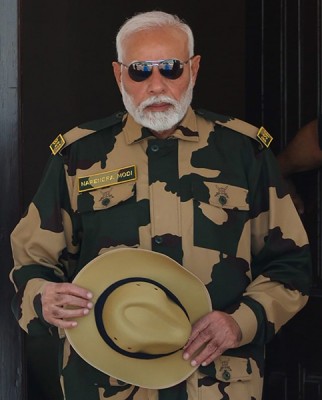
Exemplary Record
On December 29, 2019, Rapid Action Battalion (RAB) arrested five cadres of Allah’r Dal (The Army of Allah) while they were holding a clandestine meeting in the Labanchora area of Khulna District. RAB recovered some leaflets of the organisation from their possession.
On December 26, 2019, RAB arrested two cadres of the Jama'atul Mujahideen Bangladesh (JMB) from an under-construction house from the Digarkanda area in Mymensingh District. RAB recovered books promoting extremism, two laptops, two mobile phones and some leaflets from their possession.
On December 26, 2019, Police arrested six cadres of Harkat-ul-Jihad-al Islami Bangladesh (HuJI-B) from the Badda area of Dhaka city.
On December 5, 2019, RAB arrested two militants of Ansarullah Bangla Team (ABT) from the Pallabi area of Dhaka city. The elite force recovered some leaflets and jihadi books from their possession.
The Awami League-led Government, which retained power winning the 10thGeneral Elections held on January 5, 2014, continued its policy of containing Islamist extremist forces through 2019. According to partial data compiled by the South Asia Terrorism Portal (SATP), 279 militants of Islamist groupings, including 76 cadres of JMB, 70 of Jamaat-e-Islami (JeI)-Islami Chhatra Shibir (ICS), 36 of Ansar al-Islam, 31 of Allah’r Dal, 29 of Hizb-ut-Tahrir (HuT), 25 of ABT, nine of HuJI-B and three of Jamaatul Muslimeen, were arrested from across Bangladesh in different raids in 2019. There were 560 such arrests in 2018.
Two Islamist militants, both cadres of JMB, were killed in 2019. By comparison, 15 Islamist terrorists were killed in 2018, 71 in 2017, 115 in 2016, 56 in 2015 and 68 in 2014.
On November 5, 2019, the Government banned the Allah’r Dal. In an official notification, the Ministry of Home Affairs stated that the group had been banned as its activities posed a threat to public safety and security. Earlier, Bangladesh had banned seven Islamist groups – Ansar al-Islam (Supporters of Islam) (March 1, 2017), ABT (May 25, 2015), HuT (October 22, 2009), HUJI-B (October 17, 2005), JMB (February 23, 2005), Jagrata Muslim Janata Bangladesh (JMJB) (February 23, 2005) and Shahadat-e-al Hikma (Martyrdom and Islamic Wisdom, February 9, 2003).
On November 29, 2019, Global Terrorism Index 2019 noted that Bangladesh had been the most successful South Asian country in countering terrorism: “Bangladesh had the largest improvement of any country in South Asia. It recorded 31 terrorist attacks and seven fatalities in 2018, a 70 percent reduction in deaths from the prior year.” The index published by the Sydney-based Institute for Economics & Peace ranked Bangladesh 31st in 2018, down from 25th the preceding year.
Meanwhile, the War Crimes (WC) Trials, which began on March 25, 2010, have thus far indicted 125 leaders, including 50 from Jamaat-e-Islami (JeI); 27 from the Muslim League (ML); 11 from Nezam-e-Islami (NeI); five from Bangladesh Nationalist Party (BNP); two each from the Jatiya Party (JP) and Peoples Democratic Party (PDP); 27 former Razakars (a prominent pro-Pakistan militia); and one former Al-Badr member. Verdicts have been delivered against 95 accused, including 69 death penalties and 26 life sentences. So far, six of the 69 people who were awarded the death sentence have been hanged; 32 are absconding and another 31 cases are currently pending with the Appellate Division of the Supreme Court. Meanwhile, out of 26 persons who were awarded life sentences, five persons have already died serving their sentence; 13 are absconding and another eight are lodged in various jails of the country. Significantly, one indictment and six verdicts came in 2019. Altogether, 15 persons were awarded death sentences in the six verdicts.
Dhaka also continued its campaign against the Left Wing Extremist (LWE) movement. Three LWE-linked fatalities were recorded, all of LWE cadres, in 2019. These included Purba Banglar Sarbahara Party (PBSP) ‘zonal commander’ Shafiur Rahman Jyoti (65), PBSP ‘regional leader’ Atier Sardar (28) and Purba Banglar Communist Party (PBCP) ‘regional leader’ Badsha Sheikh (50). Similarly, there were eight LWE fatalities, all of cadres, in 2018; and 13, all of cadres, in 2017. There was no arrest of any LWE cadre through 2019. However, there were three such arrests in both 2018 and 2017.
Meanwhile, the problem created by the Rohingya refugees from the Rakhine State of Myanmar continued to be a security dilemma for Bangladesh. Reports indicate that Rohingya militants were active in Bangladeshi refugee camps. The International Crisis Group (ICG) report “Building a Better Future for Rohingya Refugees in Bangladesh” released on April 25, 2019, claimed that Arakan Rohingya Salvation Army (ARSA) militants and gangs mostly control the camps and often commit violence against the residents. Separately, Deutsche Welle, on September 24, 2019, reported that a man claiming to be an ARSA cadre, told Deutsche Welle that some 3,500 fighters were sheltering in the refugee camps in Bangladesh, and that a group of several hundred fighters had secretly crossed to neighbouring Myanmar for military training. But, he conceded, there was little scope for any large-scale attacks, given that the group lacked weapons and ammunition.
Online radicalization was another and growing problem in Bangladesh. On December 3, 2019, the Counter Terrorism and Transnational Crime (CTTC) unit disclosed that, in an attempt to dodge law enforcers, JMB had opted for an online platform that allows anonymous communication for recruiting new members. The Ehsar (Permanent) members of the banned militant outfit were using the TOR (The Onion Router) browser for fresh recruitments, following the same strategy used by international terrorist outfit Al-Qaeda. The browser is well-known for its ability to evade online surveillance. Currently, the outfit has some 40 Ehsar members and each of them receives a monthly payment of BTK 1,000-1,500. The CTTC disclosed that this information had been gleaned from Abu Raihan aka Mahmud, the acting Ameer (Chief) of the JMB arrested on November 25, 2019.
Separately, on October 19, 2019, Monirul Islam, Chief of the CTTC unit of the Dhaka Metropolitan Police (DMP), addressing the inaugural session of ‘Dhaka Peace Talk’ at the DMP media centre in Dhaka city, noted that militants were using online platforms to recruit fresh members by offering lucrative packages. He asserted that the recruiters were targeting youths with low mental strength, zero patriotism and minimum kindness. He also claimed that youth who had no responsibility towards family and society were also at risk of being involved in violent extremism.
In a shocking revelation, on June 21, 2019, Mohamad Moniruzzaman, Additional Deputy Inspector General of Police, at a seminar titled “Preventing Terrorism and Extremism through Community Engagement” held at BRAC University in Dhaka, claimed that some 56 per cent of people involved in militancy came from a general education background, compared to 22 per cent from a madrasa (seminary) background. The Police headquarter conducted the study based on a sample of 250 persons arrested between 2015 and 2017 for their involvement in militancy. Moniruzzaman also revealed that 80 per cent of those arrested were radicalized through the internet while 20 per cent were swayed by their peers. Further, he revealed that students of Bengali and English-medium schools used the internet more often, compared to madrassa students.
Meanwhile, on December 11, 2019, Inspector General of Police (IGP) Mohammad Javed Patwary and Dhaka Metropolitan Police (DMP) commissioner Shafiqul Islam, at a conference in Dhaka city, expressed their concern over the weak counter-extremism mechanism inside the prisons across the country. Mohammad Javed Patwary in his speech observed,
Prisons were the places where extremist suspects or convicts finally landed following the due course of law. I think there is a lot to do in prisons. We did not find any NGO working inside prisons. I believe initiatives should be strengthened to de-radicalize the terrorist or extremism suspects in jail. We should work further in this sector.
Similarly, Shafiqul Islam argued that there was a lag with respect to the counter-extremism mechanism for those who were arrested or were in jail. He further asserted that at least 99 per cent of the arrested and under-trial extremist suspects belonged to the Ahle Hadith community and their senior preachers should be engaged to spread counter-extremism messages.
After the worst terrorist attack on July 1, 2016, Bangladesh has, no doubt, taken giant strides to root out terrorism. Dhaka has demonstrated the efficacy of determined and relentless action against terrorist formations over the past years, and Sheikh Hasina’s Awami League-led Government has also demonstrated enormous courage in pressing ahead with the War Crime Trials. It is significant that the leadership of a number of Islamist extremist groups in Bangladesh was drawn from or linked to the leadership responsible for the War Crimes in 1971. The latest verdicts against the War Criminals have once again reaffirmed the Government’s determination to honour its 2008 General Election pledge to bring the guilty of the 1971 genocide to justice.
Nevertheless, as terrorists adapt to exploit new technologies and new tactics, the challenge will be kept alive. Bangladesh’s “war on terror” is unlikely to end soon.
Support Our Journalism
We cannot do without you.. your contribution supports unbiased journalism
IBNS is not driven by any ism- not wokeism, not racism, not skewed secularism, not hyper right-wing or left liberal ideals, nor by any hardline religious beliefs or hyper nationalism. We want to serve you good old objective news, as they are. We do not judge or preach. We let people decide for themselves. We only try to present factual and well-sourced news.







